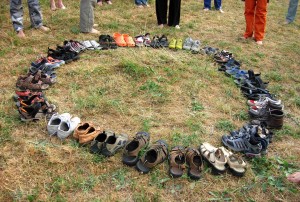This is the second of our two part blog series on unsupportive families during divorce. The first dealt with the challenges of when family is having a difficult time letting an ex go,
which can be read here. Here we discuss a second type of unsupportive family, when family may not be supportive to your grief if the ex-spouse was never well liked anyhow or if the marriage was difficult in terms of fighting or abuse.

If you are grieving from a divorce after a tumultuous marriage, it may be difficult for family and friends to understand your grief. Comments of “you are better off” or “we never liked them anyway” are frequently heard, and the lack of support can complicate the healing process. Normally we rely on our friends and family as a key support system through divorce, they listen, share stories, and provide support in so many ways, however, when friends and family choose to bash the ex, the pain and grief over the marriage doesn’t feel validated. It’s makes a person feel like they shouldn’t be hurting, it has them questioning their feelings, and quite often like they need to hide their feelings from their loved ones.
It can be challenging for people on the outside to understand how highly conflicted relationships can be difficult to move on from. It’s hard for them to get past the “you’re better off” stage, when in fact the divorcee is likely not only grieving the loss of their marriage, but grieving what could have been, wishing things would have been different, or perhaps regretting particular conflicts.
It is important not to let unsupportive family or friends invalidate feelings of anguish after divorce. Perhaps they do not fully understand your relationship, or haven’t stopped to consider that you are still heartbroken regardless of the circumstances of the marriage. You may need to confront an unsupportive family member or friend to remind them that their lack of support, however it is intentioned, is not helping you to heal. Be open to them about the type of support that you do need.
Recognize that different people may support you in different ways. Your best friend may be an excellent listener and a good shoulder to cry on, while your sister is better suited to help you get your finances or belongings in order. It’s important to remember this about people in order to have realistic expectations. If you are having a particularly down day, call someone who will support your feelings, not someone who thinks this is an opportunity to commence the ex-bashing. Keep an open mind though, the best support may come from someone you’d least expect.
Finally, realize that friends and family simply cannot offer all of the support that you may need. Counseling and divorce support groups are excellent resources. In a group setting you will find others experiencing similar feelings and yours may be validated. Together you can cope, heal, and grow from your divorce. There’s a quote from an unnamed father that reads, “One of the hardest things you will ever do, my dear, is grieve the loss of someone who is still alive.” We tend to agree.
 Sometimes your teenage children think they know everything. Do they know that if they saved the $6 they spend each day on a super antioxidant smoothie (or caramel macchiato), in 8 years they could buy a 4-door sedan in soul red or titanium flash (1)? Below are 3 lessons you should teach them about the long-term financial impact of decisions that they will soon be making for themselves.
Lesson #1: Over time, compound interest can make a little bit of savings grow to a very big amount
One of the regrets many of us has, is that we did not start saving soon enough. The idea of compound interest is something that your kids will understand by the time they are in middle school. There are numerous online calculators you can use to show them how deciding to save their money and forego that daily splurge can turn into better investments (like a new car).
Lesson #2: College is a very expensive but financially important decision
As your high schooler starts to contemplate where they want to go to college, don’t leave them out of the financing discussion. Even parents who expect to cover the entire cost of college need to make their child understand that it is a significant investment in their future, and not a nonstop party. Let them know that by completing college, they will likely earn $1 – $3 million more over their lifetime than their classmates who didn’t (2).
Lesson #3: Credit cards are a tool and not a new source of money
Credit card debt is rampant among people of all ages, but studies have shown that outstanding balances ramp up quickly after college. Before, during and after college, make sure your child understands that credit cards are not free money. Talk to them about using credit cards only to the extent that the balance can be paid off each month. Revisit Lesson #1 and show them how fast the balance on a 20% credit card can grow out of control.
The best way to drive these lessons home is to set a good example. Demonstrate good use of credit by paying off your credit cards monthly. Develop a budget and then communicate how sticking to it serves larger financial goals. It’s very likely that you have made some big financial mistakes in your life. Wouldn’t it make sense to share what you have learned so they don’t make them too?
(1) Assuming $6/day, saved for 8 years, earning 6% after fees, the total is $22,403. This exceeds the base MSRP of a 185 horsepower 2016 Mazda 6 4-door sedan with 6-speed manual transmission in Titanium Flash Mica ($21,330). The same model in Soul Red Metallic is $21,630.
(2) The Economic Value of College Majors 2015, Georgetown University Center on Education and the Workforce.
Sometimes your teenage children think they know everything. Do they know that if they saved the $6 they spend each day on a super antioxidant smoothie (or caramel macchiato), in 8 years they could buy a 4-door sedan in soul red or titanium flash (1)? Below are 3 lessons you should teach them about the long-term financial impact of decisions that they will soon be making for themselves.
Lesson #1: Over time, compound interest can make a little bit of savings grow to a very big amount
One of the regrets many of us has, is that we did not start saving soon enough. The idea of compound interest is something that your kids will understand by the time they are in middle school. There are numerous online calculators you can use to show them how deciding to save their money and forego that daily splurge can turn into better investments (like a new car).
Lesson #2: College is a very expensive but financially important decision
As your high schooler starts to contemplate where they want to go to college, don’t leave them out of the financing discussion. Even parents who expect to cover the entire cost of college need to make their child understand that it is a significant investment in their future, and not a nonstop party. Let them know that by completing college, they will likely earn $1 – $3 million more over their lifetime than their classmates who didn’t (2).
Lesson #3: Credit cards are a tool and not a new source of money
Credit card debt is rampant among people of all ages, but studies have shown that outstanding balances ramp up quickly after college. Before, during and after college, make sure your child understands that credit cards are not free money. Talk to them about using credit cards only to the extent that the balance can be paid off each month. Revisit Lesson #1 and show them how fast the balance on a 20% credit card can grow out of control.
The best way to drive these lessons home is to set a good example. Demonstrate good use of credit by paying off your credit cards monthly. Develop a budget and then communicate how sticking to it serves larger financial goals. It’s very likely that you have made some big financial mistakes in your life. Wouldn’t it make sense to share what you have learned so they don’t make them too?
(1) Assuming $6/day, saved for 8 years, earning 6% after fees, the total is $22,403. This exceeds the base MSRP of a 185 horsepower 2016 Mazda 6 4-door sedan with 6-speed manual transmission in Titanium Flash Mica ($21,330). The same model in Soul Red Metallic is $21,630.
(2) The Economic Value of College Majors 2015, Georgetown University Center on Education and the Workforce.  Sometimes your teenage children think they know everything. Do they know that if they saved the $6 they spend each day on a super antioxidant smoothie (or caramel macchiato), in 8 years they could buy a 4-door sedan in soul red or titanium flash (1)? Below are 3 lessons you should teach them about the long-term financial impact of decisions that they will soon be making for themselves.
Lesson #1: Over time, compound interest can make a little bit of savings grow to a very big amount
One of the regrets many of us has, is that we did not start saving soon enough. The idea of compound interest is something that your kids will understand by the time they are in middle school. There are numerous online calculators you can use to show them how deciding to save their money and forego that daily splurge can turn into better investments (like a new car).
Lesson #2: College is a very expensive but financially important decision
As your high schooler starts to contemplate where they want to go to college, don’t leave them out of the financing discussion. Even parents who expect to cover the entire cost of college need to make their child understand that it is a significant investment in their future, and not a nonstop party. Let them know that by completing college, they will likely earn $1 – $3 million more over their lifetime than their classmates who didn’t (2).
Lesson #3: Credit cards are a tool and not a new source of money
Credit card debt is rampant among people of all ages, but studies have shown that outstanding balances ramp up quickly after college. Before, during and after college, make sure your child understands that credit cards are not free money. Talk to them about using credit cards only to the extent that the balance can be paid off each month. Revisit Lesson #1 and show them how fast the balance on a 20% credit card can grow out of control.
The best way to drive these lessons home is to set a good example. Demonstrate good use of credit by paying off your credit cards monthly. Develop a budget and then communicate how sticking to it serves larger financial goals. It’s very likely that you have made some big financial mistakes in your life. Wouldn’t it make sense to share what you have learned so they don’t make them too?
(1) Assuming $6/day, saved for 8 years, earning 6% after fees, the total is $22,403. This exceeds the base MSRP of a 185 horsepower 2016 Mazda 6 4-door sedan with 6-speed manual transmission in Titanium Flash Mica ($21,330). The same model in Soul Red Metallic is $21,630.
(2) The Economic Value of College Majors 2015, Georgetown University Center on Education and the Workforce.
Sometimes your teenage children think they know everything. Do they know that if they saved the $6 they spend each day on a super antioxidant smoothie (or caramel macchiato), in 8 years they could buy a 4-door sedan in soul red or titanium flash (1)? Below are 3 lessons you should teach them about the long-term financial impact of decisions that they will soon be making for themselves.
Lesson #1: Over time, compound interest can make a little bit of savings grow to a very big amount
One of the regrets many of us has, is that we did not start saving soon enough. The idea of compound interest is something that your kids will understand by the time they are in middle school. There are numerous online calculators you can use to show them how deciding to save their money and forego that daily splurge can turn into better investments (like a new car).
Lesson #2: College is a very expensive but financially important decision
As your high schooler starts to contemplate where they want to go to college, don’t leave them out of the financing discussion. Even parents who expect to cover the entire cost of college need to make their child understand that it is a significant investment in their future, and not a nonstop party. Let them know that by completing college, they will likely earn $1 – $3 million more over their lifetime than their classmates who didn’t (2).
Lesson #3: Credit cards are a tool and not a new source of money
Credit card debt is rampant among people of all ages, but studies have shown that outstanding balances ramp up quickly after college. Before, during and after college, make sure your child understands that credit cards are not free money. Talk to them about using credit cards only to the extent that the balance can be paid off each month. Revisit Lesson #1 and show them how fast the balance on a 20% credit card can grow out of control.
The best way to drive these lessons home is to set a good example. Demonstrate good use of credit by paying off your credit cards monthly. Develop a budget and then communicate how sticking to it serves larger financial goals. It’s very likely that you have made some big financial mistakes in your life. Wouldn’t it make sense to share what you have learned so they don’t make them too?
(1) Assuming $6/day, saved for 8 years, earning 6% after fees, the total is $22,403. This exceeds the base MSRP of a 185 horsepower 2016 Mazda 6 4-door sedan with 6-speed manual transmission in Titanium Flash Mica ($21,330). The same model in Soul Red Metallic is $21,630.
(2) The Economic Value of College Majors 2015, Georgetown University Center on Education and the Workforce. 



